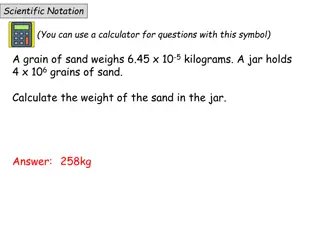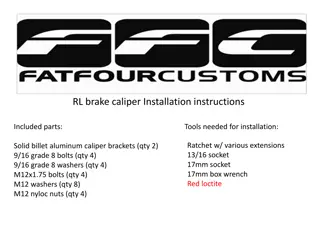Understanding the Use of Brackets in Writing
Brackets serve various functions in writing, such as clarifying quotations, indicating capitalization changes, avoiding confusion in nested parentheses, and adding additional information to direct quotes. They are distinct from parentheses in usage and play a crucial role in maintaining grammatical correctness and coherence in written language.
Download Presentation

Please find below an Image/Link to download the presentation.
The content on the website is provided AS IS for your information and personal use only. It may not be sold, licensed, or shared on other websites without obtaining consent from the author. Download presentation by click this link. If you encounter any issues during the download, it is possible that the publisher has removed the file from their server.
E N D
Presentation Transcript
Brackets Created by Ashley Massie April 2012
Brackets vs. Parentheses Like parentheses, brackets are enclosures. Brackets have fewer and more specialized uses than parentheses. Brackets and parentheses are usually not interchangeable.
Use Brackets 1. As Parentheses Within Parentheses Use brackets to avoid the confusion caused by one set of parentheses falling within another. Turn the inner pair of parentheses into brackets. Example: Johnny went to the store with his list of items (bread, milk [fat free], peanut butter, and jelly) but came home with only the bread.
Use Brackets 2. To Indicate Capitalization Changes in Quotes In quoted material, use square brackets to indicate that a letter has been changed from uppercase to lowercase, or vice versa. To avoid awkwardness, consider rewording the sentence so that no change in capitalization is needed. Example: This unusual animal was once believed to be a myth because [s]keptics insisted that the duck- billed platypus was simply a duck bill sewn onto a beaver s body (35). ( Skeptics changed to skeptics )
Use Brackets 3. To Indicate Other Changes to Quotations Use brackets to show any changes made to quotations in order to retain grammatical correctness. Use brackets in quotes to add a word, prefix, or suffix in order to fit the quote into your sentence. Use brackets to change the tense of a verb in a quote so that it will fit into your sentence. Examples: I tried to make a dish mild enough for everyone, but my idea of "add[ing] Cayenne pepper to taste" was not the same as my friend's idea. ( add changed to adding ) In Thomas Jefferson's time, there was definitely a notion that "A little rebellion now and then [was] a good thing. ( is changed to was )
Use Brackets 4. To Add Additional Information to Quotations Use brackets to insert necessary information, comments, corrections, opinions, clarifications, or explanations of your own into direct quotations. Brackets are used within quotations to tell readers that the words enclosed are yours and not those of your source. Don t overdo it! Readers will resent the explanation of obvious details. Do not use brackets when inserting additional information into your own writing. Use parentheses or dashes. Examples: He [George Lucas] reminded me a little of Walt Disney s version of a mad scientist. Dues are being raised $1.00 per week [to $5.00], the treasurer announced. The miles of excellent trails are perfect for [cross-country] skiing.
Use Brackets 5. To Acknowledge Errors in Quotations Quotations must be copied accurately, word by word, from your source errors and all. To show that you have copied a passage faithfully, place the word sic (the Latin word for thus or so ) in brackets one space after any mistake. APA and Turabian handbooks state that sic must be italicized within the brackets, while the MLA handbook does not specify. If sic can be placed outside the quotation itself, it appears between parentheses, not brackets. Molly s paper was titled King Leer (sic). Examples: Mr. Vincent s letter went on: I would have preferred a younger bride, but I decided to marry the old window [sic] anyway. The sign over the cash register read, We don t except [sic] personal checks for payment.
Information gathered from The Scott, Foresman Handbook for Writers, 5th Edition Hodges Harbrace Handbook, Thirteenth Edition Hodges Harbrace Handbook, Sixteenth Edition Writing: A College Handbook, 4th Edition The Holt Handbook, Third Edition MLA Handbook, 7th Edition APA Handbook, 6th Edition























